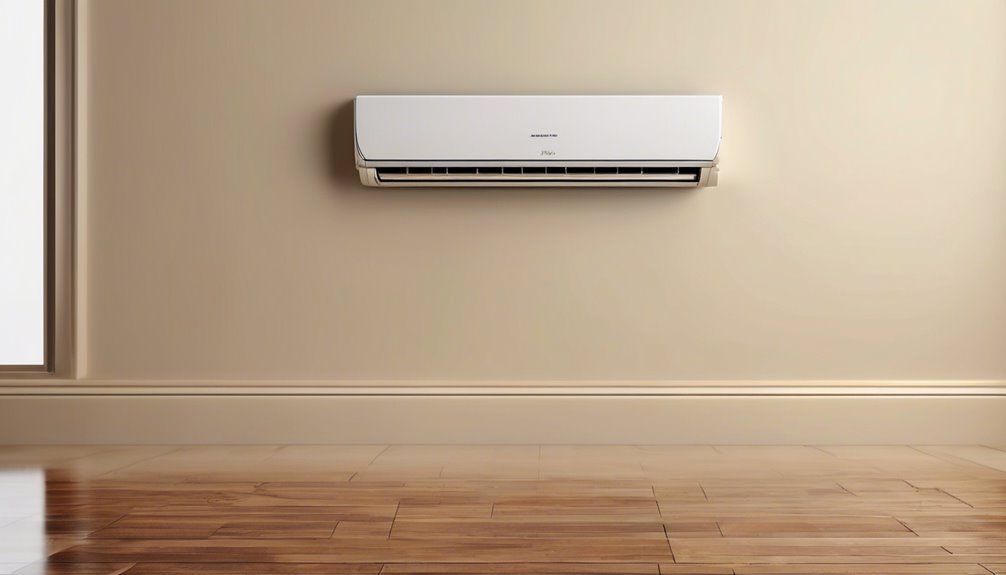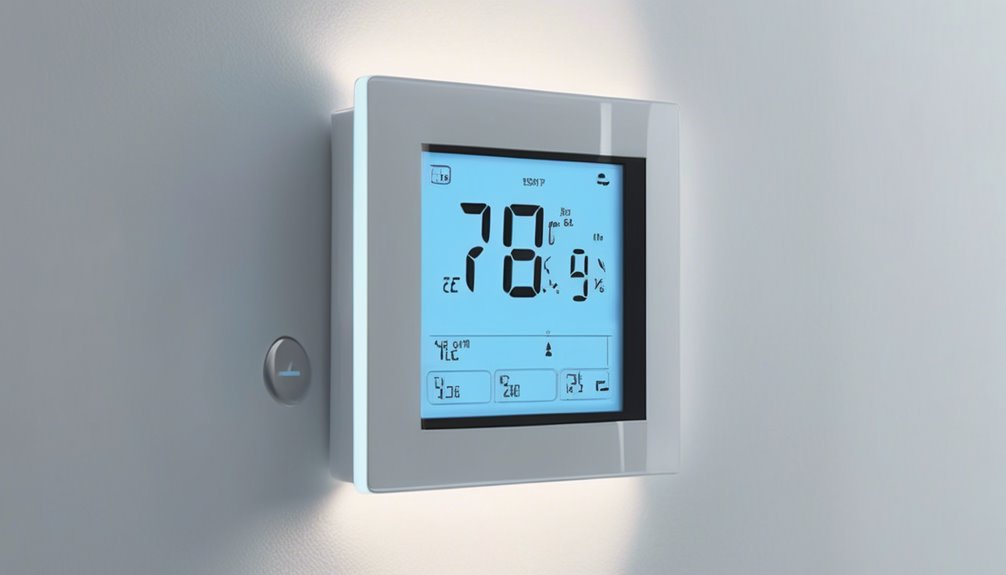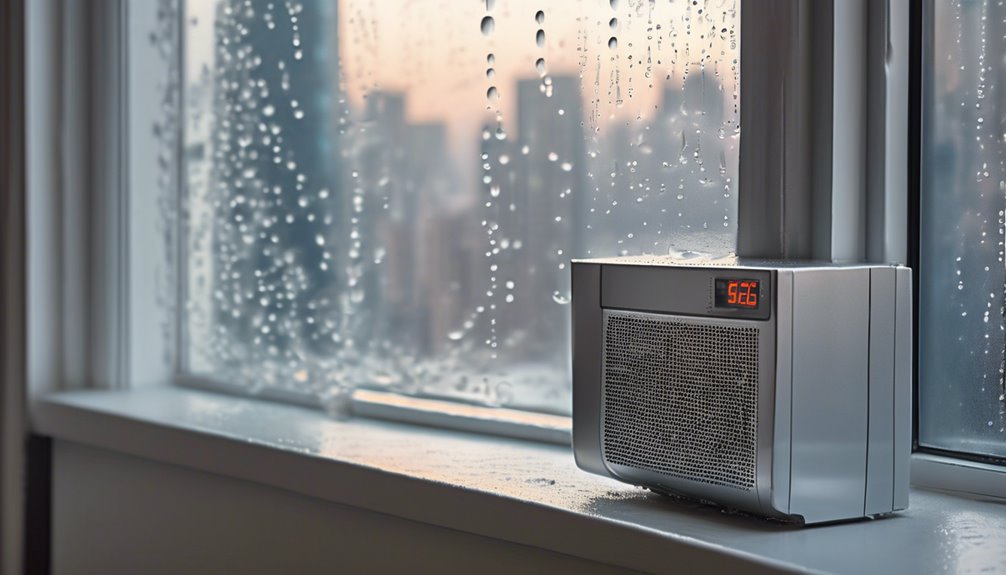If your air conditioner is leaking water inside your home, you're not alone! It's likely due to a common issue like a clogged air filter, condensate drain problems, refrigerant leaks, or coil blockages. These issues can be prevented or fixed with regular maintenance and inspections. But don't worry, figuring out the cause is often the hardest part – and by taking a closer look at your AC's components, you'll likely uncover the root of the problem and be able to fix it in no time.
Key Takeaways
- A clogged air filter can cause frozen coils and water leaks, so regular cleaning or replacement is essential.
- Refrigerant leaks can mix with water and air, causing corrosion and contamination, leading to AC water leaks.
- Improper drain installation or maintenance can cause water to back up into the AC unit, resulting in leaks and water damage.
- Coil blockages and frozen coils can restrict airflow, leading to ice buildup and water leaks from the AC unit.
- High humidity levels and inadequate drainage can cause water to accumulate and leak from the AC unit, especially if it's not designed to handle excessive moisture.
Clogged Air Filter
A clogged air filter can be a sneaky culprit behind your AC leaking water. You mightn't think to check it, but it's essential to do so regularly.
When you neglect to clean or replace your air filter, a dirty buildup forms, blocking airflow and causing your AC to work harder. This increased pressure can cause the coils to freeze, resulting in water accumulation and leaks.
Filter neglect can lead to a host of problems, including reduced airflow, increased energy bills, and even system breakdowns. By checking and maintaining your air filter, you can prevent these issues and keep your AC running smoothly.
Condensate Drain Issues
When you're dealing with an AC leaking water, it's essential to inspect your condensate drain system.
You'll want to check for clogged condensate drain lines, improper drain installation, and frozen coil issues, as these are common culprits behind water leaks.
Clogged Condensate Drain Lines
Your air conditioner's condensate drain line is responsible for removing condensate water from the system.
However, if it gets clogged, you'll face condensate backup, leading to water leaks inside your home. You mightn't realize it, but neglecting drain maintenance can cause debris, dirt, and algae to accumulate in the drain line, blocking the water's path.
This blockage will force the water to back up into your AC unit, causing leaks and water damage. To avoid this, make sure to perform regular drain maintenance, such as cleaning the drain line and ensuring it's properly sloped.
Improper Drain Installation
Condensate drain issues can also arise from improper drain installation, which is often overlooked during the initial setup of your AC unit.
When the condensate drain isn't installed correctly, it can lead to water accumulation and leakage inside your home. A common mistake is failing to ensure the drain is sloped correctly, which is crucial for proper drainage.
A sloped drain allows gravity to help direct condensate water out of the unit and into the drainage system. If the drainage slope is too shallow or non-existent, water will accumulate and eventually leak out.
Make sure your condensate drain is installed with a sufficient drainage slope to prevent water from pooling and causing damage.
Frozen Coil Issues
A frozen coil can be a nightmare for your air conditioner, and it's often linked to condensate drain issues.
When your AC's coil freezes, it prevents the unit from cooling your home efficiently. Ice buildup causes this issue, which can occur due to dirty air filters, low refrigerant, or clogged condensate drains.
To fix the problem, you'll need to thaw the coil. Coil thawing methods include turning off your AC, letting it defrost naturally, or using a hair dryer on a low setting to speed up the process.
Once the coil is thawed, ensure your condensate drain is clear and functioning properly to prevent future freezing issues. Regular maintenance can help prevent frozen coils and keep your AC running smoothly.
Refrigerant Leaks
Refrigerant leaks are a common culprit behind AC water leaks, and they can be particularly frustrating to diagnose and repair. When refrigerant leaks, it can mix with water and air, causing corrosion and contamination. This can lead to further issues, such as refrigerant contamination and overcharge, which can worsen the leak.
| Causes of Refrigerant Leaks | Effects on AC | Solutions |
|---|---|---|
| Corrosion from moisture | Refrigerant contamination | Inspect and clean coils |
| Improper installation | Refrigerant overcharge | Check for leaks and repair |
| Wear and tear | Reduced cooling performance | Replace worn-out parts |
| Physical damage | Increased energy bills | Insulate and protect coils |
Blocked Condenser Coils
When your air conditioner's condenser coils get clogged, it can cause water to leak from the unit.
This happens because the coils can't dissipate heat properly, leading to condensation buildup and eventually, leaks.
Dusty fins are a common culprit behind blocked condenser coils.
As the fins accumulate dirt and debris, they reduce airflow, causing the coils to work harder and overheat.
To prevent this, you should prioritize coil maintenance.
Regularly clean your condenser coils to ensure they're free from dust and dirt.
This simple task can save you from costly repairs and water damage down the line.
Frozen Evaporator Coils
Your air conditioner's evaporator coils are crucial for heat absorption, but they can become frozen, leading to water leaks.
When the coils freeze, it restricts airflow, causing the AC to work harder and eventually leading to ice buildup. Ice buildup causes can include low refrigerant levels, clogged air filters, or poor maintenance.
To resolve the issue, you'll need to defrost the coils. Coil defrosting methods include turning off the AC and letting it thaw naturally or using a hair dryer to speed up the process.
Make sure to identify and address the root cause of the freeze to prevent future occurrences.
High Humidity Levels
High humidity levels in your home can cause your air conditioner to leak water, especially if the AC is not designed to handle excessive moisture. If you live in a humid climate, it's essential to ensure your AC is equipped to handle the moisture buildup. Failure to do so can lead to water leaks and other issues.
| Factors | Effects |
|---|---|
| High humidity | AC struggles to cool, leading to increased condensation |
| Inadequate drainage | Water accumulates, causing leaks and damage |
| Poor maintenance | AC's ability to handle moisture is compromised |
| Incorrect installation | AC is not designed to handle local humidity levels |
Leaky Drain Pan
A leaky drain pan is a common culprit behind water leaks in air conditioners.
Leaky drain pans are a common and often overlooked culprit behind water damage and air conditioner malfunctions.
You mightn't think about it often, but your AC's drain pan is responsible for collecting condensate water that forms during the cooling process.
If it's not functioning properly, water can overflow and leak inside your home.
- Pan corrosion: Over time, the pan can rust or corrode, causing holes and cracks that allow water to escape.
- Clogged drain line: If the drain line is blocked, water can't flow out, causing the pan to overflow.
- Improper sloping: If the pan isn't sloped correctly, water can pool and leak out.
- Lack of drain maintenance: Failing to clean and inspect the drain pan regularly can lead to clogs and corrosion.
Improper Installation
The installation process of your air conditioner can also be a major contributor to water leaks.
If your AC wasn't installed correctly, you may start noticing water dripping from the unit. Installation errors, such as sloppy mounting, can cause the condensate pan to tilt, allowing water to spill over and leak onto your floor.
Additionally, if the AC isn't level, it can disrupt the flow of condensate, leading to water accumulation and eventual leaks. You may have also noticed that the drainage system wasn't properly connected, which can cause water to back up and leak into your home.
Make sure to inspect your AC installation to identify any potential issues that may be causing water leaks.
Frequently Asked Questions
Can I Fix an AC Water Leak Myself or Do I Need a Pro?
You can attempt to fix an AC water leak yourself with a DIY toolkit, but if you're unsure or lack experience, it's best to hire a pro to avoid further damage and ensure proper air conditioner maintenance.
Will a Leaking AC Cause Water Damage to My Walls and Ceiling?
You're right to worry about water damage, as a leaking AC can compromise your home's structural integrity. If you don't address the issue, water seepage can spread, causing discoloration, warping, or even ceiling collapse, so it's crucial to act fast and get it fixed.
How Much Does It Cost to Repair an AC Water Leak?
You're wondering how much it'll cost to fix that AC water leak. Leak detection methods can range from $100 to $500, while repair costs vary from $200 to $2,000, depending on the severity and whether you'll need to cover water damage costs, which can add up quickly.
Can a Leaking AC Spread Mold and Mildew in My Home?
You're right to worry – a leaking AC can spread mold and mildew in your home, compromising air quality and triggering mold growth on walls, ceilings, and furniture, which can exacerbate respiratory issues and musty odors.
Will a New AC Unit Stop Leaking Water if I Replace the Old One?
If you replace your old AC with a new one, you'll likely stop the water leak, but only if the new installation is done correctly. Make sure to check the warranty coverage to ensure any potential issues are covered.
Conclusion
So, your AC is leaking water inside – frustrating and messy! Now that you've read through the common culprits, it's time to take action. Check your air filter, condensate drain, and coils for blockages. Inspect for refrigerant leaks and ensure proper installation. If the issue persists, consider calling a pro to diagnose and fix the problem. Remember, addressing the leak ASAP will save you from water damage and mold growth. Get to it!


